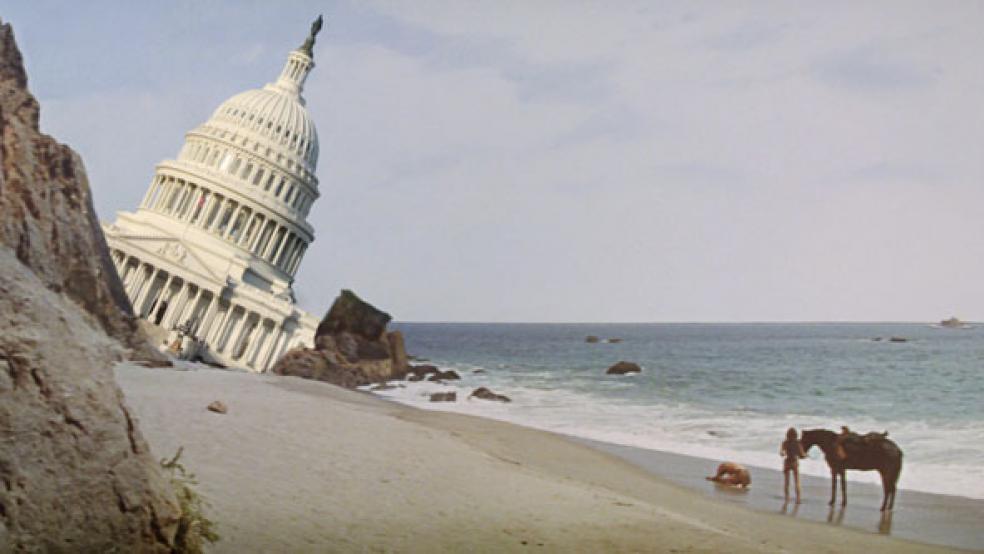It wasn’t a good sign late last week when Senate Minority Leader Harry Reid (D-NV) introduced a bill assuring that all of the 2.7 million federal workers eventually would be paid if the government shuts down in ten days.
With the Obama administration digging in its heels and congressional Republicans sorely divided over controversial funding for Planned Parenthood, Washington may be headed for the once-unthinkable – a second government shutdown within two years that could jar the economy and put many people temporarily out of work. As they have done so often in the past, lawmakers allowed the budget process to flounder for months while they tended to other issues and then went on vacation for the month of August.
Related: Boehner May Have Found an Escape Hatch on Budget Standoff
As a result, Washington begins this week on high alert, with the very real prospect that federal workers will be sent packing, government buildings and museums will be shuttered and national parks and the Washington Monument will be closed to the public in a week and a half unless both sides come to their senses. Politics are as fractured as ever today, with right wing Republicans not only battling with President Obama and the Democrats over spending issues and the Iran nuclear deal, but also threatening to topple their own leaders.
On Friday, the GOP-controlled House approved legislation to freeze funding for Planned Parenthood in the wake of this summer’s hidden-camera video controversy. The move is an attempt to placate the party’s hardliners who would rather shutter the government than see another federal dollar go to the women’s health care organization, which also performs late-term abortions and has been accused of selling fetal body parts.
Like Reid, House Speaker John Boehner (R-OH), who could face a revolt by conservatives, is leaving nothing to chance. On Thursday the chamber approved a measure invoking “martial law,” meaning any spending bill that funds the government and clears the powerful Rules Committee can be brought to the floor immediately, skipping the usual one-day wait. This suggests that Boehner and others expect the battle to keep the government open will go down to the wire-- Sept. 30.
Related: Obama Warns Republicans Not to ‘Play Chicken’ with the Economy
Washington is a city accustomed to crisis, legislative gridlock and last-minute congressional derring-do, and most roll with the punches. Yet Washington may be headed for a nervous breakdown – or at least a case of very frayed nerves – this week. That’s because many sections of the city will be closed to traffic and an estimated 250,000 to 350,000 people will flock to D.C. in hopes of catching a glimpse of Pope Francis during his historic three-day day visit.
On one hand, Pope Francis – described by Vice President Joseph Biden as “the most popular man in the world” -- may prove to be a calming influence as he celebrates Mass, addresses a joint-session of Congress, confers with President Obama and other top political and religious leaders and waves to the throngs. But his entourage will also leave traffic gridlock in its wake, and add to the general crisis atmosphere of the city.
Just as the pope departs for New York on Thursday, China President Xi Jinping Xi will arrive on Friday for a summit meeting with President Obama and a state dinner that will pose new security and traffic challenges for the city.
The visit also represents a policy minefield for Obama, as he tries to convince Beijing there should some form of courtesy between the two superpowers when it comes to cybersecurity.
Related: Forget China, the More Immediate Threat to Your Portfolio Is From Congress
After he’s feted by the White House, Xi will leave for the United Nations General Assembly in New York, with Obama not much farther behind. That summit will present its own set of security and traffic congestion problems, as it will be the first attended by Russian President Vladimir Putin in 10 years.
Moscow has been a thorn in the administration’s side on a range of issues, most recently its massive military build-up in Syria. Obama could also face fallout from allies like Israel, still upset over the Iran nuclear deal.
But at least those travails will take place in a different city.






